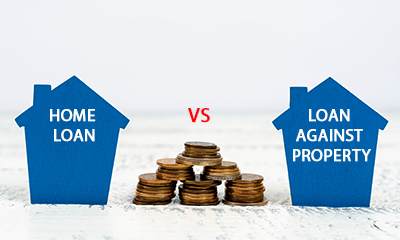What is Loan Against Property

Leveraging Your Assets: Understanding Loans Against Property
Loan Against Property (LAP) stands out as a valuable option for individuals seeking substantial funds by leveraging their existing property. This type of loan, secured through various banking and non-banking financial corporations, allows you to borrow money using the value of your residential or commercial property as collateral. Also known as a Mortgage Loan or Collateral Loan against property, LAP provides a flexible and often cost-effective way to meet significant financial needs.
In this article, we'll explore the essentials of LAP, the types of properties you can use as collateral, eligibility criteria, interest rates, advantages, and the application process.
Let us introduce you to Loan Against Property.
What is a Loan Against Property?
LAP, or Loan Against Property, is a type of secured personal loan that you can obtain through various banking and non-banking financial corporations. This type of loan allows you to borrow funds using the value of your existing property (residential and commercial) as security. LAP is also called a Mortgage Loan or Collateral Loan against property.
Which properties can you take a loan against?
There 2 types of properties you can get a loan against: Residential Property and Commercial Property.
Residential property is the most common type of property accepted by lenders as collateral, which means if you need a loan and currently own a home, this is the best way to increase your chances.
However, you can also secure a loan from your commercial/ business property. Commercial property may also qualify you for a lower interest rate.
One thing to look out for both these properties is that there are no ownership disputes. Only when one has a clear ownership title over a property, it can be used as a security against LAP.
Know your eligibility for a Loan Against Property
Any salaried or self-employed individuals can benefit from LAP by leveraging their residential or commercial properties.
Apart from being a citizen of India, here is the primary eligibility criterion every bank follows:
● Age: At least 21 years and not older than 65-70.
●Job: Salaried or self-employed individual
●Minimum Income: Rs.3 lakh per year.
●Experience: Minimum experience of 1-5 years
●Loan Amount: Upto Rs.25 crore.
● Repayment Time: 15-20 years (Maximum)
What are the interest rates on a loan against property?
Every loan attracts interest, meaning the loan against your property should be repaid with an interest amount. But how much is the interest, and how is it calculated?
Various factors influence decisions related to interest rates; let's discuss a few below:
1. Credit Score: You cannot completely ignore the benefits of a good credit score. Your credit score determines your chances of repaying your loan. A good credit score means better chances of loan disbursement and lower interest rates.
2. Property location and value: Lenders consider the current market value of your property and its location to determine potential future prices.
3. The loan-to-value (LTV) ratio: The LTV ratio indicates the portion of the value of your property that a lender is willing to loan you. This ratio helps them determine the maximum loan amount they can offer against your property. This ratio is calculated by dividing the loan amount by the appraised market value of your property. Lenders typically issue loans between 50 and 70 % of the value of your property. For example, if your property is valued at Rs. 1 crore and the lender has an LTV ratio of 70%, the maximum loan you qualify for would be Rs. 70 lakh (70% of Rs. 1 crore).
4. Stability and Work History: Long-term employment shows you can be trusted to repay the loans and might even be eligible for lower interest rates.
5. Loan Tenure: The interest rate depends on the LAP duration. Longer durations typically have higher rates than shorter ones.
Is a Loan Against Property the right choice for you?
Now that you have all the info, how do you decide if a Loan Against Property (LAP) is the right choice for you?
Let's look at a few advantages and disadvantages of Loan Against Property.
Advantages:
● When compared to unsecured personal loans like personal loans, student loans and credit cards, LAP typically allows you to borrow more significant sums of money.
● Loan Against Property carries less risk for the lender; therefore, interest rates are frequently lower.
● LAP provides you the option of longer loan terms and more flexibility with multiple repayment schedules and options.
-
LAP does not restrict how you use the loan amounts, which means you can use the loan for any purpose of your choice from paying debts to going on a vacation.
Disadvantages
● Longer waiting periods: The waiting period to obtain a loan after applying for one is rather lengthy. Banks have to investigate the applicant's past to confirm their identity before granting a loan.
● Lengthy Inspections: Intense bank inspections and checks, such as repayment capacity and credit score, are only a few of the factors the bank will consider. This can be the reason your loan application is denied or delayed.
How do you apply for a Loan Against Property?
You can apply for a Loan Against Property from a financial lender of your choice and then follow the below steps:
Step 1: Visit the website and apply for a loan here.
Step 2: Collect the required documents. Below is a given list of documents required for salaried and self-employed individuals.
For salaried Individuals :
-
Proof of residence (any one of the following):
Ration Card
Telephone Bill
Electricity Bill
Voter's ID Card
-
Proof of identity (any one of the following):
Voter's ID Card
Employer's Card
-
Latest Bank Statement/Passbook where your salary is credited for the previous 6 months
-
Salary slip for the previous 6 months showing all deductions
-
Form 16 for the previous 2 years
-
Copies of all the property documents of the concerned property to be pledged for the loan
For self-employed individuals:
-
Certified Financial Statement for the previous 3 years
-
Proof of residence (any one of the following):
Ration Card
Telephone Bill
Electricity Bill
Voter's ID Card
-
Proof of identity (any one of the following):
Voter's ID Card
Employer's Card
-
Latest Bank Statement/Passbook where your salary is credited for the previous 6 months
-
Copies of all the property documents of the concerned property to be pledged for the loan
Step 3: Fill out the form and submit your documents. Once your documents are submitted, the lenders will thoroughly inspect and carefully verify your details.
Step 4: As your details are checked, the officials will adequately examine your property.
Step 5: Once your application meets all the requirements and your property is validated, the bank will disburse the loan and credit the amount to your bank account.
In Conclusion:
A loan against property is a great way to leverage your assets and fund your financial requirements. With expert-led assessment and a hassle-free verification process, availing of a Loan Against Property with Aadhar Housing Finance is a reliable process.
- Aadhar Housing Finance has been awarded and recognised as ‘The Best Brand 2021’ at the 4th Edition of ‘The Economic Times – Best Brands 2021’ held at Sahara Star in Mumbai on 21st December, 2021.
- Aadhar Housing Finance was conferred with the 'CSR Times Award 2021' for the successful initiatives implemented under its CSR project, ‘Aayushmaan Aadhar’ at the 8th National CSR E-Summit, on 17th December, 2021.
- Aadhar Housing Finance was conferred with 'India CSR Leadership Award 2021' on 10th Dec, 2021 in 'Community Health' category for its impactful community-centric initiatives conducted under Aayushman Aadhar project.
- Aadhar Housing Finance has received ‘Maharashtra State Best Employer Brand Award, 2021’ at the 16th Employer Branding Awards hosted on 23rd Nov, 2021 by World HRD Congress for our exemplary work in HR. Aadhar has translated and combined vision with action leading to better people strategies and cultivation of competencies in order to enable the organization to be future ready.
- Aadhar Housing Finance Ltd bagged 5 awards across below categories at ‘Banking Frontiers NBFC Awards & Conference 2021’ (DNA Awards 2021) virtual summit held on 20th Aug, 2021. 1) Best Cyber Security Initiative - 1st Prize 2) Best API Initiative - 1st Prize 3) Best Omnichannel CX Initiative - 2nd Prize 4) Best Cloud Initiative - 2nd Prize 5) Esteemed Trophy (IT & Digital Group)
- Awards & Recognition: We received two prestigious awards at the 7th Edition of ‘National Awards For Excellence in BFSI 2021’ which was held virtually on 26th Aug 2021, in mentioned categories: 1) Aadhar Housing Finance Ltd received the ‘Affordable Housing Finance Company of the Year’ award, 2) Shri Deo Shankar Tripathi, MD & CEO, Aadhar Housing Finance Ltd has was conferred with ‘CEO of the Year’ award.
- Awards & Recognition: For the Second consecutive year, Aadhar Housing Finance has been certified as a ‘Great Place To Work’ by Great Place To Work Institute, a Global authority on recognizing high-trust and performance driven culture at workplaces.
- Awards & Recognition: Aadhar Housing Finance is certified as a ‘Great Place To Work’ by Great Place To Work Institute (India). This is a significant milestone for Team Aadhar as ‘The Great Place to Work Model’ is the world’s most researched, accepted and sustainable definition of a great workplace from an employee’s point of view. It is a comprehensive framework encompassing the overall employee experience ecosystem.
- Awards & Recognition: Aadhar Housing Finance won for the 3rd year in a row at The Outlook Money Awards. Team Aadhar received the Silver award in the Affordable Housing category at the Outlook Money Conclave held in Mumbai on 27th Feb, 2020.
- Awards & Recognition: Shri Deo Shankar Tripathi, MD & CEO, Aadhar Housing Finance received the ‘Top Most Influential BFSI Leaders’ award at the World BFSI Congress & Awards, in Mumbai on 14th Feb 2020.
- Awards & Recognition: Shri Deo Shankar Tripathi, MD & CEO, Aadhar Housing Finance received ‘the NBFC Leadership Award 2020’ at the 8th NBFC 100 Tech Summit held in Mumbai by Banking & Finance Post and Elets on 23rd January 2020.
- Awards & Recognition: The Aadhar Annual Report 2018-19 wins all India 3rd Prize in the PRSI National Awards 2019 at the 41st All India Public Relations Conference – Hyderabad
- Awards & Recognition: Aadhar Housing Finance is one of the ‘Best BFSI Brands 2019’: Aadhar Housing Finance received ‘The Economic Times Best BFSI Brands 2019’ award at the India-UAE Strategic Conclave 2019 held in Dubai on 15th October, 2019
- Awards & Recognition: Aadhar Housing Finance received ‘The affordable Home Loan Provider Of The Year 2018’ award from Union Minister Shri Nitin Gadkari at Outlook Money Conclave in Mumbai on 12th March, 2019 for the exemplary work in supporting the ‘Housing for All’ mission in India.
- Aadhar Housing Finance received the Prestigious ‘PMAY Empowering India Award 2019’ from Union Minister Shri Hardeep Singh Puri in Delhi on 5th March, 2019 for its exemplary work in supporting the ‘Housing for All’ mission in India.
- Dun & Bradstreet included Aadhar Housing Finance in 'India's Leading BFSI Companies 2019' list. The report was published by Dun & Bradstreet Information Services in March, 2019.
- Aadhar is declared one of the 1) ‘DREAM COMPANIES TO WORK FOR’ (Financial Services) and 2) ‘DREAM EMPLOYER OF THE YEAR’ presented by ET Now on 16th Feb, 2019 at the World HRD Congress in Mumbai.
- Shri Deo Shankar Tripathi, MD & CEO, Aadhar Housing Finance was recognized and felicitated as one of ‘100 Top Most Influential BFSI Leaders’ at the ‘World BFSI Congress’ held in Mumbai on 14th Feb, 2019.
- Aadhar Housing Finance bagged the ‘Most Promising Brand For Housing Finance’ award at the ‘World BFSI Congress’ presented by ET Now in Mumbai on 14th Feb, 2019.
- Aadhar Housing Finance won ‘Prestigious Brands of India 2019’ award at the conference held at Sahara Hotel in Mumbai on 12th Feb, 2019. The list of prestigious brands was judged and presented by BARC (Brand Advertising Research and Consulting), a global brand consultancy firm and ERTC Media, one of India’s leading independent media consulting & brand listing organisations. The recognition solidifies Aadhar as a leader within housing finance segment across various parameters such as brand recall, impact, trust, positioning, growth, reach, and innovation.
- Aadhar Housing Finance won the prestigious Finnoviti 2019 award at ‘Finnoviti Awards & Conference’ presented by Banking Frontiers and their Knowledge Partner Deloitte in Mumbai on 25th January, 2019 for innovative distribution and referral model named ‘Aadhar Mitra’.
- Aadhar Housing Finance bagged 2 prestigious awards at the ‘Banking, Financial Services & Insurance Awards’ presented by ABP News in Mumbai on 28th November, 2018:
- Housing Finance Company of the Year (Medium and Small) – for our exemplary work in the affordable housing finance segment.
- Marketing Campaign of the Year – for our recent brand campaign #GharBanegaTohDeshBanega.
- Aadhar MD & CEO awarded the ‘BFSI Leadership Award’ in Nov 2018 by ‘The Banking and Finance’ magazine and ‘elets’.
- Aadhar MD & CEO awarded the ‘Certificate of Excellence’ under “30 most innovative Business Leaders to watch in 2018” in July 2018 by ‘The CEO Magazine’.
- Aadhar receives the Award as the “Best Affordable Home Loan Provider of the Year 2017” at the ‘Outlook Money Awards’ March 2018.
- Aadhar CEO receives the ‘Inclusive Business Leaders Award’ from International Finance Corporation (IFC) for Aadhar’s exemplary work in Inclusive Business at the 2012 Inclusive Business Leaders Forum in Tokyo, Japan.
Report











